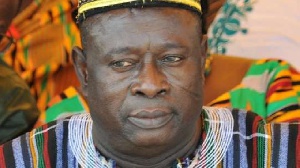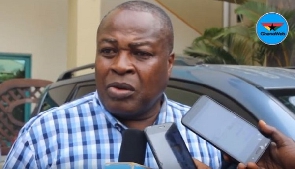The Member of Parliament for Zebilla, Cletus Avoka, has attributed the longstanding Bawku conflict to historical and socio-political factors dating back to pre-colonial and colonial periods.
Speaking on Good Morning Ghana on Metro TV on Wednesday, October 29, 2024, he criticised commentators on the issue, stating that many lack a thorough understanding of the issues.
He traced the roots of the conflict to the arrival of the Mamprusi in Bawku during the Trans-Saharan trade era. As trade routes facilitated the movement of goods such as gunpowder and kola nuts through Salaga, then to Nalerigu and Bawku, the Nayiri, chief of the Mamprusi, decided to establish a security presence in Bawku to protect traders from threats, including attacks from Kusasi inhabitants.
According to Avoka, the Nayiri’s solution was to station Mamprusi settlers at Bawku, thus initiating the complex coexistence between the Kusasi and Mamprusi communities.
"The history is documented and it is that the Kusasis in Bawku used to waylay the traders coming from the north or south and seize their wares. The story is that because they used to come from Naveligu first, the Nayiri decided that he will put up a police post in Bawku to protect the traders when they were coming back from the north or south or going from the south to the north. So, he sent some few Mamprusis to Bawku to settle there and maintain the trade route.
"So, the story is that the Kusasis were there and harassing the traders. That is why the Nayiri decided to do that. So, they came there, and they only co-existed. They were not part of the traders . And this is what happens when the Kusasis come to a place: we have the Kusasi Community Chief, we have the Frafra Community Chief, and the rest of them, and none of them can aspire to become the Ga-Mantse," he explained.
He continued that "No matter how strong they are, they can never become Ga-Mantse because they have come to settle here and do business. The Ashantis and the Akans are many in Accra, but none of them can become Ga-Mantse. That is the story of Bawku. And, when the Europeans came in 1900, they were going to rule the area through chiefs because they didn't have administrative personnel. So, they settled first in Nalerigu-Gambaga with the Nayiri. That is where the White man settled first. From there, the Nayiri princes, interpreters, and facilitators escorted them south to Bawku. Naturally, when they got to Bawku, they weren't excited with the persons who were there protecting the trade route."
He stated that during the colonial period, British authorities sought to rule indirectly through recognized chiefs.
This posed a challenge at Bawku, as the Kusasi followed a decentralised clan system rather than a singular chiefdom.
Cletus Avoka continued to explain that the British ultimately recognised the Mamprusi as Bawku Naaba, thereby positioning a Mamprusi chief as the administrative head of Bawku.
This arrangement, however, sparked tensions, with Kusasi resistance intensifying after the Mamprusi Bawku Naaba’s death in 1956.
"The White man wanted to see one chief control the whole area. We don't have one chief controlling the whole area. There are Tidanas and clan heads and the rest of them and so the White man decided if the Mamprusis know chieftaincy, they will make the Mamprusi settlers in Bawku the Bawku Naaba. That is all, So, since then, the Kusasis have been struggling and struggling and they caught up with the independence struggle, etc.
"In 1956, the Mamprusi Bawku Naaba died and in 1957, the Mamprusis left Bawku to go to Nalerigu to go to the Nayiri for enskinment; they normally go to the Nayiri for enskinment to come back and rule the Kusasis in Bawku," he stated.
He explained that in 1957, amidst independence-era calls for self-governance, the Kusasi declared their own Tidana, or clan chief, and refused to accept the Mamprusis authority.
This led the colonial government to establish a Commission of Inquiry to investigate the claims.
"So, he set up a Commission of Enquiry to ascertain the claims between the Kusasis and the Mamprusis as to who are the land owners and who is supposed to be the traditional rulers of Bawku. The committee was chaired by a lawyer from the Volta Region. The two other members were Nana Agyeman Badu I and the late Dormaa Hene.
"They went to Bawku, settled there, and investigated the case and presented the report to the colonial governor that in fact the Mamprusis came there as settlers and the Kusasis are doing everything and what not and what not, and that is why it is only a Mamprusi family and the Kusasi is a whole tribe and the rest of them, and therefore it is administratively, politically, and developmentally wrong for the Nayiri, who has a family in Bawku, to impose a Mamprusi chief on the Kusasis, which is untraditional and uncultural," he said.
He added that "The colonial government accepted and approved and issued a white paper recognising a Kusasi man as Bawku Naaba and the head chief of the Kusasi area."
He emphasised that understanding this historical context is essential to resolving the ongoing conflict and ensuring respect for the rule of law in a situation that impedes constructive dialogue and sustainable solutions.
"I am very saddened that many of the commentators on this issue do not actually know the facts or the background, and they proffer to give expert advice; others know, and they don't want to say the truth. Some people don't want to accept the truth. Some people don't want to accept that we have the rule of law or due process," he added.
The conflict reignited after a parallel chief returned to Bawku following the withdrawal of his arrest warrant by a court of appeal.
The death toll from the renewed violence in the area has risen to 16, as shared by the Minister of Chieftaincy and Religious Affairs, Stephen Asamoah Boateng, on Tuesday, October 29, 2024.
For years, Bawku, a commercial town in the Upper East Region, has been plagued by ethnic tensions stemming from chieftaincy disputes.
JKB/AE
You can watch a compilation of the Twi news below:
Click to view details



General News of Wednesday, 30 October 2024
Source: www.ghanaweb.com

















